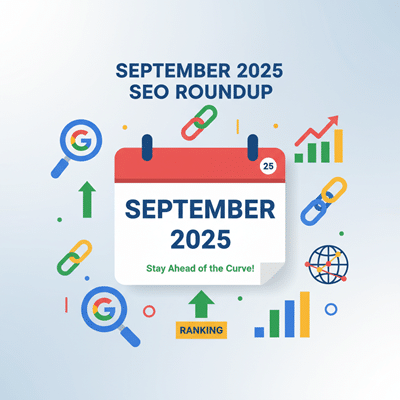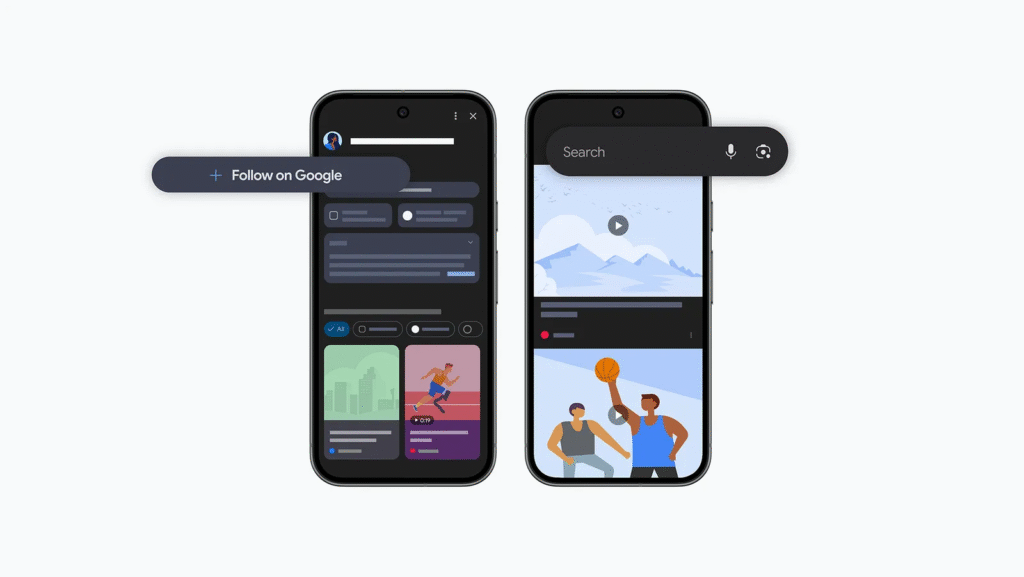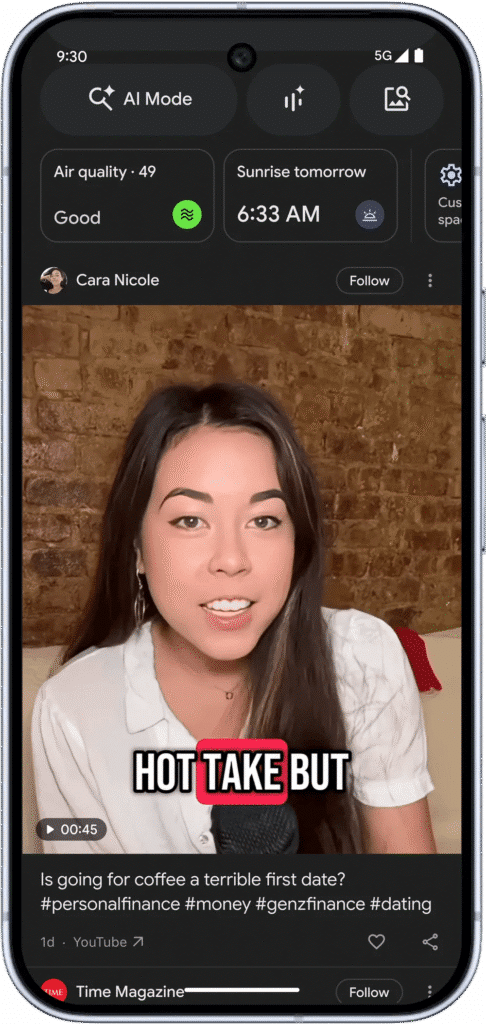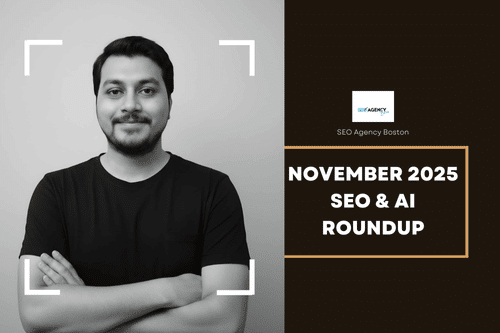The landscape of search engine optimisation (SEO) in September 2025 was anything but tranquil. Amidst the barrage of spam updates, the challenges of disrupted rank tracking, ongoing lawsuits concerning AI Overviews, and Google’s transformation of Discover into a social feed, those in the SEO field certainly found themselves busy navigating a complex landscape.
If you’ve been curious about the facts versus the speculation, here’s your comprehensive monthly summary.

Google’s August 2025 Spam Update Wraps Up
What happened:
Google has officially announced that its August 2025 Spam Update has been completed on September 21, following a 27-day rollout period. Similar to previous extensive updates, this one mainly targeted low-quality, AI-generated content and websites that take advantage of automated spam strategies.
Impact:
- Some sites saw brutal declines in traffic.
- Some have noted significant recoveries — indicating that Google favored websites demonstrating clear EEAT signals(experience, expertise, authoritativeness, and trustworthiness).
Rumour mill:
There is much speculation within the community that this update serves a dual purpose, addressing spam while also gearing up for AI-driven ranking evaluations. There’s a buzz suggesting that platforms lacking robust author or brand indicators might face ongoing challenges in the upcoming months.
The “&num=100” Saga and Rank Tracking Chaos
What happened:
Google has discreetly eliminated the &num=100 parameter, which enabled SEOs and various tools to view 100 search results on each page. The alteration led to unexpected declines in Google Search Console (GSC), creating a sense of bewilderment.
Check this post: https://www.linkedin.com/feed/update/urn:li:activity:7373206410689634304/
Impact:
Rank-tracking tools such as Ahrefs acknowledged that the removal of certain parameters has affected their ability to accurately measure position changes. SEOs observed a decline in impressions, while clicks remained unchanged — indicating that data influenced by bots might have skewed reports from the start.
Rumour mill:
Is Google implementing this solely to prevent scraping? Could this be a facet of the so-called “great decoupling”, where GSC data fails to mirror the actual search landscape? No one can say definitively — yet the shifts in AI have certainly raised eyebrows among SEOs.
Google Discover Becomes a Social Feed
What happened:
Google has introduced a Follow feature in Discover, allowing users to subscribe to their favorite publishers. In addition to this, an increasing amount of social content, including posts from X, Instagram, and YouTube Shorts, is now making its way into feeds.

Image Source: Google

Image Source: Google
Impact:
- Publishers have the opportunity to cultivate direct audiences through Discover.
- Content creators get increased visibility.
- Competition for placement will likely rise.
Rumour mill:
Certain SEOs are referring to this as Google’s strategic response to TikTok, transforming Discover into a blend of news and social media. Is it going to hold up? History serves as a reminder of Google+, and only time will reveal the outcome.
Reference: https://blog.google/products/search/discover-updates-september-2025/
Chrome Enters the AI Era
What happened:
Google has unveiled a revamped version of Chrome featuring Gemini integration. Highlights consist of:
- AI Mode in the omnibox (address bar).
- Cross-tab summarisation and contextual search.
- AI-powered scam protection and autofill.
Impact:
For the first time, artificial intelligence is seamlessly integrated into the browsing experience. This has the potential to change default search behaviour, redirecting user engagement from traditional blue links to more interactive conversational outcomes.
Rumour mill:
There’s talk in the industry that this could potentially eat into Google’s own search traffic — yet, it seems Google is focused on ensuring users remain inside its ecosystem regardless of the outcome.
Reference: https://blog.google/products/chrome/chrome-reimagined-with-ai/
Circle to Search Gets Continuous Translation
What happened:
Google has enhanced Circle to Search with a feature that allows you to translate while you scroll. This means you can seamlessly continue translations without having to restart them when content changes or when you switch between apps.
Impact:
A more seamless translation experience is on the way for Android, starting with Samsung devices.
Rumour mill:
Certain SEOs are convinced that we are merely scratching the surface of real-time AI translation inside search engine results pages (SERPs), a development that could significantly impact multilingual publishers dependent on clicks in their native languages.
Reference: https://blog.google/products/search/real-time-translate-circle-to-search-android/
Penske Media Sues Over AI Overviews
What happened:
Penske Media Corporation (PMC) — The parent company of Rolling Stone, Variety, and Billboard has initiated legal action against Google, claiming that AI Overviews replicate their content without appropriate credit.
Impact:
- If this proves effective, it may compel Google to adjust or limit the scope of its AI-generated summaries.
- Other publishers might take similar actions, leading to a series of legal disputes.
Rumour mill:
Opinions vary on whether this lawsuit marks the beginning of a significant challenge for publishers or if settlements will merely extend Google’s timeline
Reference: https://www.axios.com/2025/09/14/penske-media-sues-google-ai
Broken Links: AI Search vs Google
What happened:
An extensive study by Ahrefs found that AI chatbots send users to broken pages nearly 3x more often than Google Search does. ChatGPT had the highest rate of broken links, with around 1% resulting in 404 errors, while Google maintained a much lower rate of only 0.15%.
Rumour mill:
There’s a humorous buzz among SEOs suggesting that 404 pages might evolve into a fresh frontier for optimisation, crafted like mini-landing pages to attract traffic generated by AI misinterpretations.
Other Industry Buzz
- OpenAI hiring SEO — proving SEO isn’t dead just yet.
- ChatGPT citation drop — On September 11, a sudden drop of 90% in citations led to speculation regarding potential licensing problems.
- Agent Payments Protocol (AP2) — A collaboration between Google and 60 partners, including Mastercard, PayPal, and Coinbase, has introduced a framework for AI agents to facilitate secure e-commerce transactions.
Common FAQs About SEO Roundup for September 2025
The conclusion of Google’s August 2025 Spam Update made a significant mark, focusing on thin and AI-generated content.
This aligned with Google’s elimination of the &num=100 parameter, which caused a disturbance in bot-driven impression inflation.
Google has rolled out a Follow feature for publishers and enhanced the integration of social content from platforms like X, Instagram, and YouTube Shorts.
Chrome has now integrated Gemini AI capabilities such as tab summarization, an omnibox AI Mode, and enhanced scam detection.
PMC has filed a lawsuit against Google, claiming that AI Overviews are utilizing their content without proper attribution or compensation for the traffic generated.
Not always — Ahrefs discovered that AI search directs users to broken pages almost three times more frequently than Google.
No. OpenAI is even on the lookout for SEO experts, highlighting the ongoing importance of SEO.
The Rumour Mill Keeps Turning
September 2025 underscored a distinct development: the fusion of SEO and AI has become inseparable. Spam updates are streamlining the removal of low-quality content, while rank tracking tools face disruptions. Discover is taking cues from social media, and AI features are gradually integrating into browsers and search engine results pages. With the addition of lawsuits and broken-link studies, the SEO industry is navigating through unfamiliar territory.
The pressing inquiry that SEOs are pondering: Is Google crafting the future of search, or merely trying to catch up with its AI rivals?





